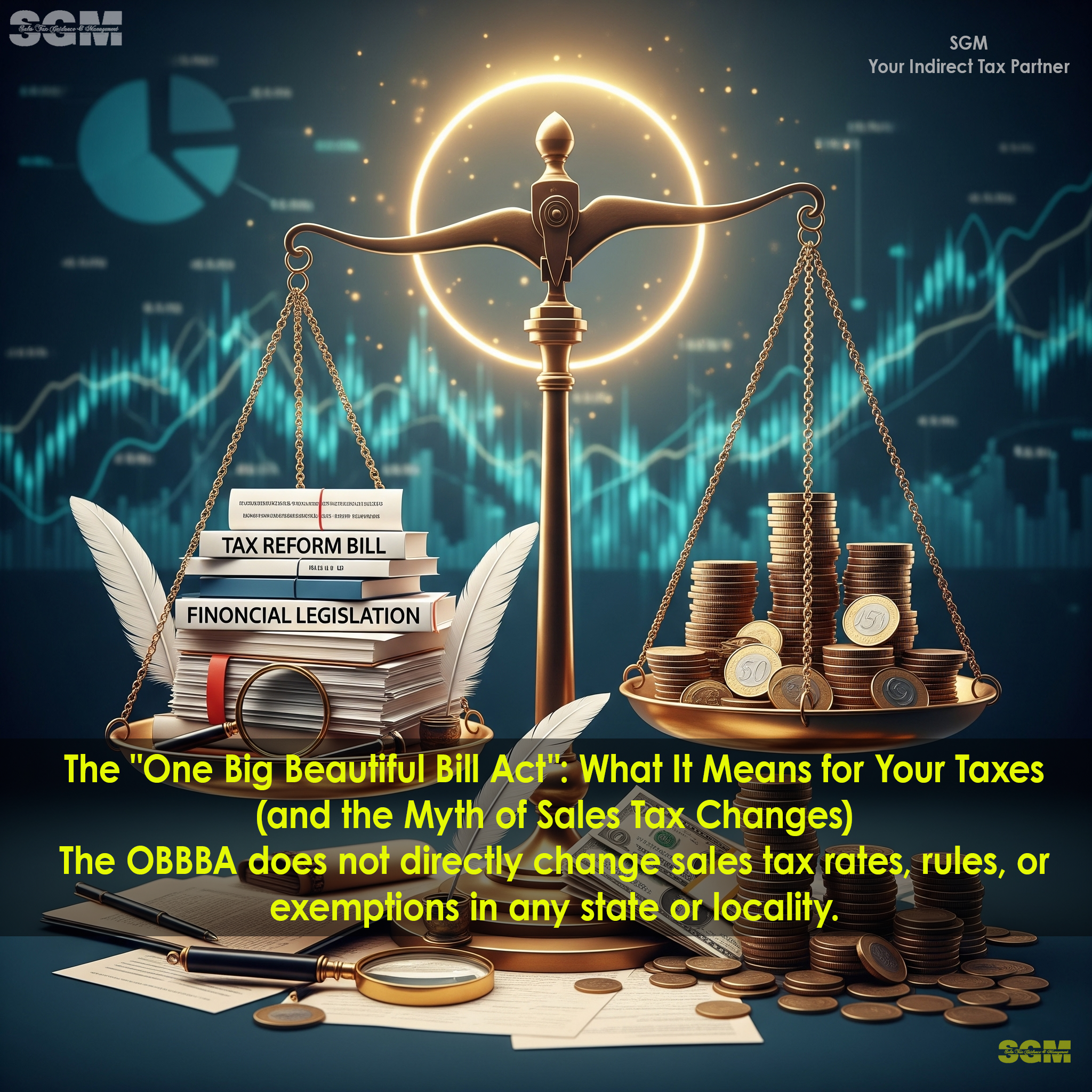The "One Big Beautiful Bill Act": What It Means for Your Taxes (and the Myth of Sales Tax Changes)
The recent passage of the "One Big Beautiful Bill Act" (OBBBA) by the U.S. Congress has sent ripples through the tax landscape, prompting many questions about its widespread implications. As a significant piece of federal legislation, the OBBBA introduces sweeping changes, primarily impacting federal income taxes for individuals and businesses.
However, amidst the discussions, a common misconception has arisen: does the OBBBA directly alter your state and local sales taxes? Let's clear the air.
The Short Answer on Sales Tax: Not Directly
It's crucial to understand that sales tax is a state and local matter in the United States, not a federal one. States and their localities levy sales taxes, set their rates, and determine what goods and services are subject to them.
The One Big Beautiful Bill Act is a federal statute. Its provisions are designed to reshape the federal income tax code, extend existing tax cuts, and introduce new deductions and credits at the federal level. Therefore, the OBBBA does not directly change sales tax rates, rules, or exemptions in any state or locality.
Where Sales Tax Might Come Into Play: The SALT Deduction
While the OBBBA doesn't touch sales tax rates, there's an indirect connection through the State and Local Tax (SALT) deduction.
For taxpayers who itemize their deductions on their federal income tax returns, the SALT deduction allows them to deduct certain state and local taxes paid, including property taxes, income taxes, or general sales taxes.
Here's how the OBBBA impacts the SALT deduction:
- A Temporary Increase in the SALT Cap: The OBBBA temporarily raises the cap on the federal SALT deduction from the previous $10,000 limit (established by the 2017 Tax Cuts and Jobs Act) to $40,000 for taxpayers earning below certain income thresholds. This higher cap is set to last for a limited period (reportedly through 2029).
- The Indirect Benefit: For individuals in high-tax states who itemize and pay a significant amount in state and local taxes (which could include a substantial amount of sales tax, depending on their spending habits and state rules), this increased cap means they might be able to deduct a larger portion of those taxes on their federal return. This could lead to a lower federal taxable income and, consequently, a lower federal income tax bill.
Important Note: This doesn't mean your sales tax bill to your state changes. You still pay the same sales tax amount at the point of purchase. The impact is on how much of that state-level tax you can claim as a deduction on your federal income tax return.
Beyond Sales Tax: Key Changes from the OBBBA
While the sales tax impact is indirect, the OBBBA brings significant direct changes to other areas of federal taxation:
- Permanent Tax Cuts: Many individual and business tax cuts from the 2017 TCJA, which were set to expire, have been made permanent. This includes current income tax rates and the increased standard deduction.
- New Deductions (Temporary): The bill introduces temporary federal deductions for things like qualified tip income and overtime compensation, along with a deduction for interest on loans for U.S.-assembled vehicles.
- Child Tax Credit Boost: The maximum Child Tax Credit sees an increase and will be indexed for inflation.
- Business Tax Incentives: Provisions like 100% immediate expensing (bonus depreciation) for certain business investments are now permanent.
- 1099 Reporting Thresholds Adjusted: The thresholds for various 1099 forms have been revised, potentially reducing reporting burdens for many.
- Reversal of Green Energy Credits: Many clean energy tax credits established under previous legislation are being phased out or repealed.
- New Remittance Tax: A 1% excise tax is introduced on certain money transfers from the U.S. to international jurisdictions.
What This Means for You
The One Big Beautiful Bill Act is a complex piece of legislation with far-reaching consequences for federal tax planning. While it doesn't directly change your sales tax bill, its impact on the federal SALT deduction could provide some relief for itemizing taxpayers in high-tax states.
As with any major tax reform, it's essential to consult with a qualified tax professional to understand how the OBBBA specifically impacts your individual or business financial situation. They can help you navigate these changes and optimize your tax strategy under the new law.
Stay connect with SGM to ensure compliance with these new regulations.
Suggested keyword:
One Big Beautiful Bill Act, OBBBA tax impact, OBBBA explained, Big Beautiful Bill tax law, Trump tax bill 2025, Federal tax changes 2025, New US tax law OBBBA, OBBBA individual tax, OBBBA business tax, OBBBA sales tax impact, OBBBA SALT deduction, State and Local Tax deduction OBBBA, Sales tax federal bill, Does OBBBA affect sales tax?, OBBBA property tax deduction, Federal tax vs state sales tax OBBBA, US tax reform 2025, New tax legislation US, Tax law changes 2025, Permanent tax cuts, Tax policy updates, Income tax reform, Business tax changes, OBBBA no tax on tips, OBBBA overtime deduction, OBBBA auto loan interest deduction, OBBBA senior tax deduction, OBBBA Child Tax Credit, OBBBA 1099 reporting changes, OBBBA remittance tax, Trump Accounts OBBBA, How OBBBA affects my taxes, OBBBA impact on taxpayers, Tax planning OBBBA, Consult tax professional OBBBA, Understanding OBBBA for individuals, OBBBA small business tax


